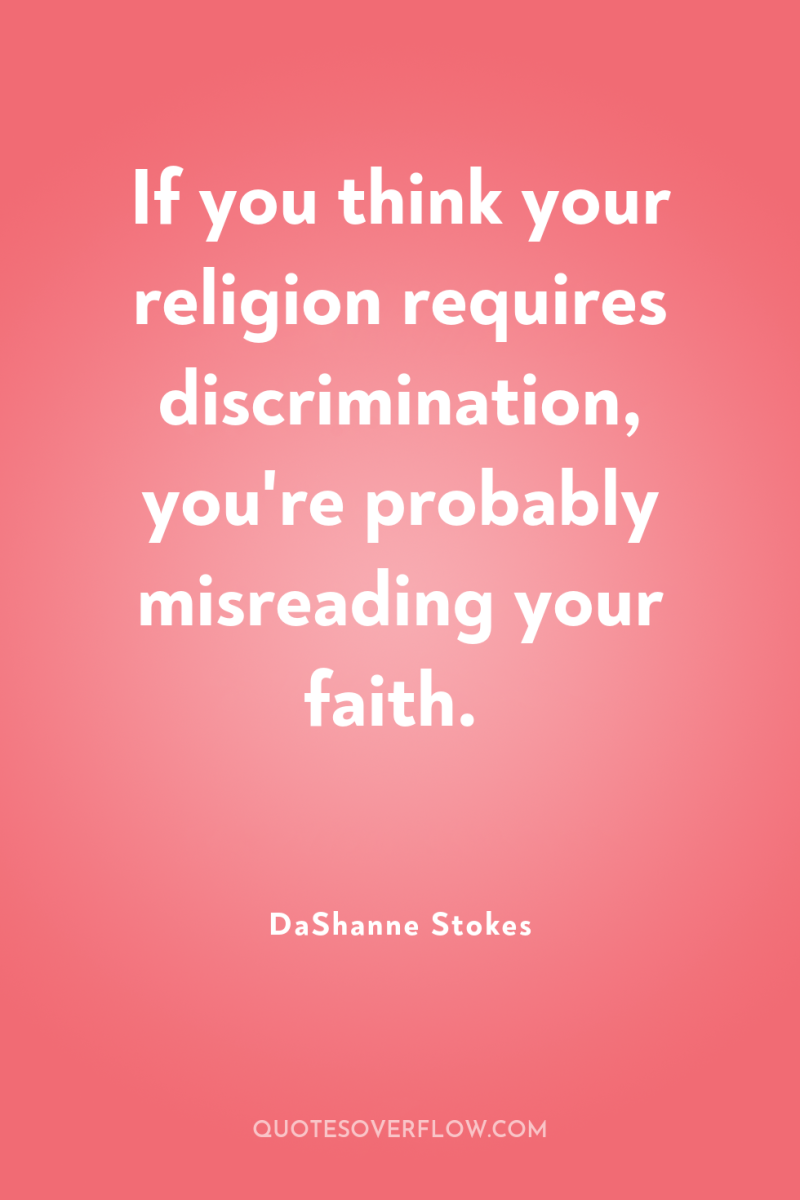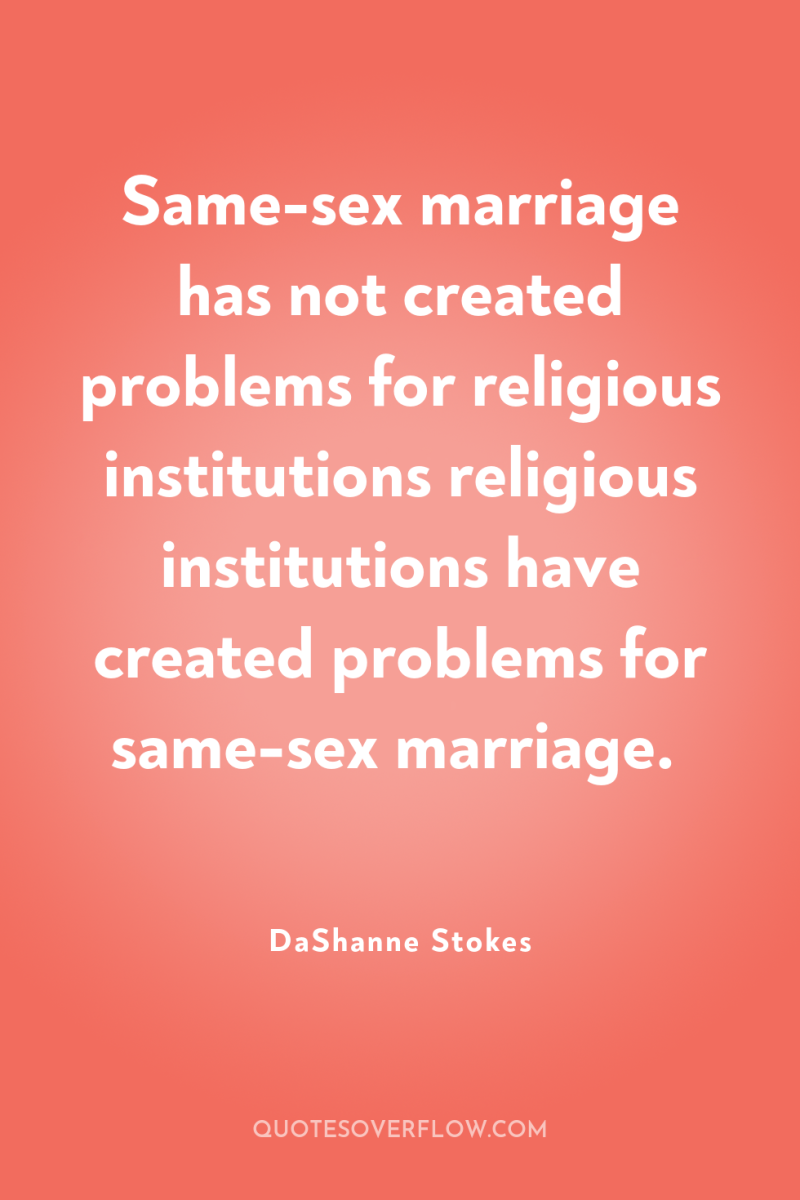
1
If you think your religion requires discrimination, you're probably misreading your faith.DaShanne Stokes

2
Same-sex marriage has not created problems for religious institutions religious institutions have created problems for same-sex marriage.DaShanne Stokes
3
This was borne out again in October 1996 when Pope John Paul II, standing in the context of a train of Catholic thought which stretched back to the Church Fathers said, in essence, "Looks like there's some good evidence for some sort of biological evolution."[22] That is, he said, as so many Catholics have already said, that there is nothing in divine revelation that particularly forbids you to believe that God made Adam from the dust of the earth r-e-a-l-l-y s-l-o-w-l-y rather than instantaneously (and used other creatures to somehow assist in the process) so long as you bear in mind that God did, in fact, create man and woman (particularly the soul, which is made directly by God and is not a result of the collision of atoms). --Making Senses of Scripture .Mark Shea
4
But we have no [Marian] apparitions cautioning the Church against, say, accepting the delusion of an Earth-centered Universe, or warning it of complicity with Nazi Germany – two matters of considerable moral as well as historical import.. Not a single saint criticized the practice of torturing and burning “witches” and heretics. Why not? Were they unaware of what was going on? Could they not grasp its evil? And why is [the Virgin] Mary always admonishing the poor peasant to inform the authorities? Why doesn’t she admonish the authorities herself? Or the King? Or the Pope? .Carl Sagan
5
A Christian people doesn't mean a lot of goody-goodies. The Church has plenty of stamina, and isn't afraid of sin. On the contrary, she can look it in the face calmly and even take it upon herself, assume it at times, as Our Lord did. When a good workman's been at it for a whole week, surely he's due for a booze on Saturday night. Look: I'll define you a Christian people by the opposite. The opposite of a Christian people is a people grown sad and old. You'll be saying that isn't a very theological definition. I agree.. Why does our earliest childhood always seem so soft and full of light? A kid's got plenty of troubles, like everybody else, and he's really so very helpless, quite unarmed against pain and illness. Childhood and old age should be the two greatest trials of mankind. But that very sense of powerlessness is the mainspring of a child's joy. He just leaves it all to his mother, you see. Present, past, future -- his whole life is caught up in one look, and that look is a smile. Well, lad, if only they'd let us have our way, the Church might have given men that supreme comfort. Of course they'd each have their own worries to grapple with, just the same. Hunger, thirst, poverty, jealousy -- we'd never be able to pocket the devil once and for all, you may be sure. But man would have known he was the son of God; and therein lies your miracle. He'd have lived, he'd have died with that idea in his noddle -- and not just a notion picked up in books either -- oh, no! Because we'd have made that idea the basis of everything: habits and customs, relaxation and pleasure, down to the very simplest needs. That wouldn't have stopped the labourer ploughing, or the scientist swotting at his logarithms, or even the engineer making his playthings for grown-up people. What we would have got rid of, what we would have torn from the very heart of Adam, is that sense of his own loneliness.. God has entrusted the Church to keep [the soul of childhood] alive, to safeguard our candour and freshness.. Joy is the gift of the Church, whatever joy is possible for this sad world to share.. What would it profit you even to create life itself, when you have lost all sense of what life really is? .Georges Bernanos
6
What could there be in this document written by a young girl in 1917?Peter J. Tanous
7
For, from the time that the Bishop of Rome had gotten to be acknowledged for bishop universal, by pretence of succession to St. Peter, their whole hierarchy, or kingdom of darkness, may be compared not unfitly to the kingdom of fairies; that is, to the old wives' fables in England concerning ghosts and spirits, and the feats they play in the night. And if a man consider the original of this great ecclesiastical dominion, he will easily perceive that the papacy is no other than the ghost of the deceased Roman Empire, sitting crowned upon the grave thereof: for so did the papacy start up on a sudden out of the ruins of that heathen power.Thomas Hobbes
8
In medieval times, contrary to popular belief, most knights were bandits, mercenaries, lawless brigands, skinners, highwaymen, and thieves. The supposed chivalry of Charlemagne and Roland had as much to do with the majority of medieval knights as the historical Jesus with the temporal riches and hypocrisy of the Catholic Church, or any church for that matter. Generally accompanied by their immoral entourage or servants, priests, and whores, they went from tourney to tourney like a touring rock and roll band, sports team, or gang of South Sea pirates. Court to court, skirmish to skirmish, rape to rape. Fighting as the noble's substitution for work.Tod Wodicka
9
A plain, brown paper-wrapped package came in the mail recently. Upon opening it, I saw that it was a patchwork quilt about four feet by five feet. Many little scraps of cloth, carefully joined by loving hands. Two squares have suggestions of a black cassock and Roman white collar. The maker of the quilt states, “In its variety, I feel it denotes confusion and the world “mixed” up. There are dark spots for the dark times and bright squares, so, hopefully, some good and brightness will come in the future. The other pieces of cloth were of happy times, mothers and children, peaceful settings, happy things.” A note inside stated that she felt we were “scraps, ”–the “scraps” that the abusive priests treated us like. They would use us as a scrap is used and then simply toss us aside. I was moved to tears. Holding it in my hands, I could almost feel others' pain and suffering, as I touched each panel. It is a magnificent work, worthy of a prize. I was deeply humbled by the receipt of the quilt. This woman got it; she really got it. This woman got it; she really got it. She has a deeper understanding of what we have gone through. It is rare. .Unknown
10
The most evil institution in the world is the Roman Catholic Church.H.G. Wells
11
I think that it [the Church] stands for everything most hostile to the mental emancipation and stimulation of mankind. It is the completest, most highly organized system of prejudices and antagonisms in existence. Everywhere in the world there are ignorance and prejudice, but the greatest complex of these, with the most extensive prestige and the most intimate entanglement with traditional institutions, is the Roman Catholic Church. It presents many faces towards the world, but everywhere it is systematic in its fight against freedom. .H.G. Wells
12
For the humanists, whatever authority Scripture might possess derived from the original texts in their original languages, rather than from the Vulgate, which was increasingly recognized as unreliable and inaccurate. In that the catholic church continued to insist that the Vulgate was a doctrinally normative translation, a tension inevitably developed between humanist biblical scholarship and catholic theology.. Through immediate access to the original text in the original language, the theologian could wrestle directly with the 'Word of God, ' unhindered by 'filters' of glosses and commentaries that placed the views of previous interpreters between the exegete and the text. For the Reformers, 'sacred philology' provided the key by means of which the theologian could break free from the confines of medieval exegesis and return ad fontes to the title deeds of the Christian faith rather than their medieval expressions, to forge once more the authentic theology of the early church. .Unknown
13
There are so many priests who enter triumphantly and walk up toward the altar, greeting people left and right, so as to appear sympathetic. Just look at the sad spectacle of some Eucharistic celebrations.. Why so much frivolousness and worldliness at the moment of the Holy Sacrifice? Why so much profanation and superficiality, given the extraordinary priestly grace that renders us able to make the Body and Blood of Christ substantially present by the invocation of the Spirit? Why do some think that they are obliged to improvise or invent Eucharistic Prayers that conceal the sacred prayers in a wash of petty, human fervor? Are Christ's words insufficient, making it necessary to multiply merely human words? In such a unique and essential sacrifice, is there any need for such a display of imagination and subjective creativity? "In praying do not heap up empty phrases as the Gentiles do; for they think that they will be heard for their many words", Jesus warns us (Mt 6:7).Robert Sarah
14
Down through the centuries, the Church has carefully preserved, protected, and defended its Marian teachings, because to give them up would be to give up the gospel.Scott Hahn
15
Hence it's funny to read in the New York Times that liberal Catholic activists are pushing for a change in Church teaching on issues relating to -- well, let's admit it, sex. Nobody is out there demanding the popes revisit the condemnation of Jansenism (don't ask), or settle the question of whether divine grace is or isn't resistable. No, journalists want to know what the Church thinks about whether one person should poke another and, if so, where, when, and how. What liberal Catholics and the journalists who love them are really asking for isfor the Church to admit that it was teaching a set of harsh, repressive errors for nineteen centuries and that now it is very, very sorry. .John Zmirak
16
Men speak of God’s love for man… but if providence does not come in this hour, where is He then? My conclusion is simple. The Semitic texts from Bronze Age Palestine of which Christianity is comprised still fit uncomfortably well with contemporary life. The Old Testament depicts a God capricious and cruel; blood sacrifice, vengeance, genocide; death and destruction et al. Would He not approve of Herr Hitler and the brutal, tribalistic crusade against Hebrews and non- Christian ‘untermensch?’One thing is inarguable. His church on Earth has produced some of the most vigorous and violent contribution to the European fascist cause. It is synergy. Man Created God, even if God Created Man; it all exists in the hubris and apotheosis of the narcissistic soul, and alas, all too many of the human herd are willing to follow the beastly trait of leadership. The idea of self-emancipation and advancement, with Europe under the jackboot of fascism, would be Quixotic to the point of mirthless lunacy.Daniel S. Fletcher
17
The recasting of the Origin Myth as a story about the perils of disobedience precipitated a kind of decoupling of scripture from religious experience: when religious authorities began to insist on the literal truth of scripture, they were effectively promoting a kind of secular rationalism that states that one does not need to have a religious experience of any kind to live a moral life: all one has to do is declare one’s faith in scripture, in the doctrine of Jesus’ divinity and such, and accept the authority of the Holy Catholic Church as God’s representative on Earth.Daniel Waterman